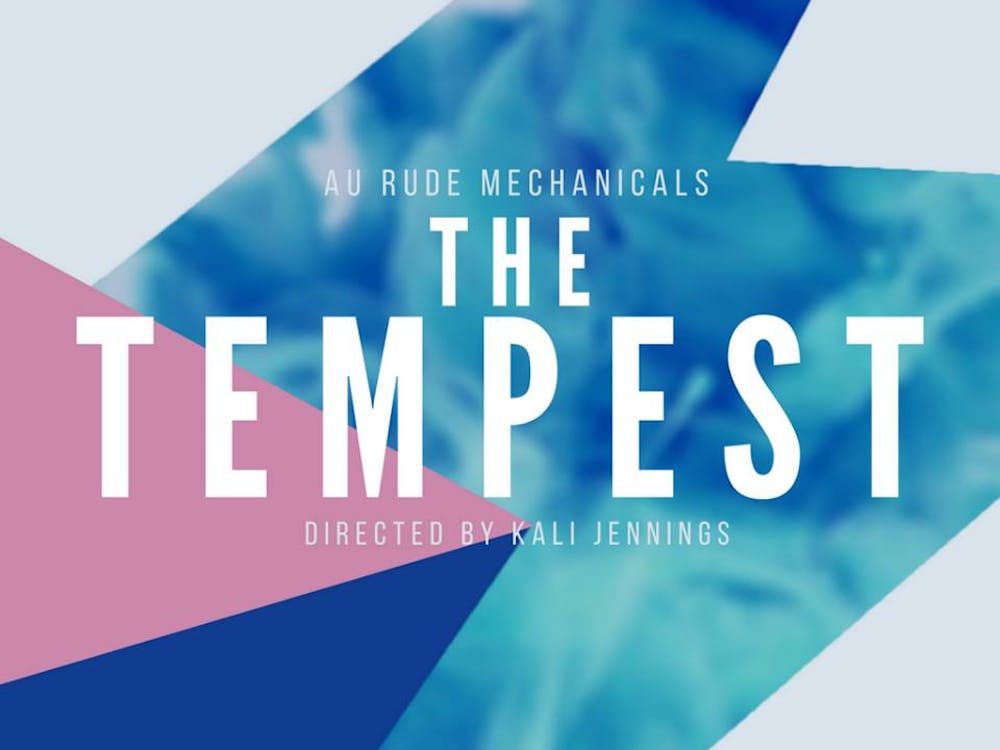After attending the wonderful Variety Show in October, I could not stay away from the AU Rude Mechanicals and their productions. Led by Executive Director Elizabeth Morton, the Rude Mechanicals perform plays by William Shakespeare and from the Jacobean era like the upcoming production of “The Changeling” this weekend. This time, I had the pleasure of watching the magnificent production of “The Tempest” on Nov. 17.
Following the Rude Mechanicals’ tradition for unique performing spots, the Rudes’ performance took place on the sixth floor of AU’s Spring Valley Building, a lecture hall transformed into a stage. As seats were close to the stage, the actors faced the challenge of performing directly alongside their audience.
However, all of the actors were up for the test and faced it quite flawlessly - never once did they break character. Immersed with the elaborate set design, the constant movement of the performance was fluid and graceful thanks to the work of dancer and choreographer sophomore Saira Grewal and sophomore dancers Jenna-Noor Khan and Chandni Thakker.
Directed by sophomore Kali Jennings, “The Tempest” is a lush, creative reimagining of Shakespeare’s classic play. Before the lights fell, Jennings explained that their production focused on themes of misogyny, colonialism and racism. In our ever-changing, unpredictable political landscape, these themes seemed more relevant than ever.
The story behind “The Tempest” is admittedly rather confusing. One of Shakespeare’s later plays, it follows Prospero, the Duke of Milan, who is exiled with his daughter Miranda on an island. Ariel, a sprite, serves Prospero and Miranda but wishes for her freedom. Caliban, an inhabitant of the island, also wishes for freedom, and plots for control of the island. Amidst these conflicts, Prospero uses magic to shipwreck his unloyal brother Antonio, as well as King Alonso of Naples, the king’s brother Sebastian and son Ferdinand, and Gonzalo, a friend to Prospero and Miranda.
With so many different plots intersecting with one another, Jennings and the actors pay careful attention in each scene in order to properly set the mood. When two drunkards, played by senior Nathaniel Caspari and freshman Cal Doughan, are stranded on the island and form an alliance with Caliban (Catherine Dione Ashley), hilarity ensues. Both Caspari and Doughan use exaggerated movements and embrace the humor of their roles. Sophomores Hannah Wilson-James and Sam Megill, as Miranda and Ferdinand, respectively, are a delight to watch, portraying a tentative romance to the audience. Jennings’ split of the character Ariel into two roles was further enjoyable. Played by freshmen Sofia Sandoval-Feriss and Lena Sibony, the Ariels danced and entranced. Both Sandoval-Feriss and Sibony have great chemistry with one another and flawlessly convey the character’s desperation and deep longing for freedom.
It would be remiss to not highlight the talents of freshman Catherine Dione Ashley as Caliban. Ashley steals every scene that she appears in. When she speaks, there is righteous anger in her voice and her presence is one of command but also sympathy.
Although Shakespeare’s text paints Caliban as a villain and Prospero as the protagonist, Jennings’ direction subverts this. In the Rudes’ production, Prospero (freshman Daniel Patton) thrives on dominance and control. Through Ashley’s powerful and empathetic performance, Caliban is our true hero, a beacon of hope for freedom and justice in a world of corruption.
It is amazing to me that both Ashley and Patton are only freshmen. Both work so well together, especially in a tense, action-filled scene where Caliban and Prospero use their magical powers against each other. Patton, who delivered an equally compelling performance as Brutus in the Variety Show, was initially the understudy. Despite his limited time of a week till the show, he was absolutely captivating to watch and held a commanding and convincing presence. The finale of the show, where Caliban is freed and Patton offers a final soliloquy, was one of the most powerful and uplifting performances I have seen.
We are living in difficult times. Right now, art is one of the many ways we can find solace and understanding while we exist in this world. I am grateful for having had the experience of seeing “The Tempest” for it took me away from the problems of reality and planted me in a place where justice prevails and reconciliation is offered. Truly, I think we have much to learn from this “brave new world.”
Naomi Zeigler is a senior in the College of Arts and Sciences and the Opinion Editor for The Eagle.





